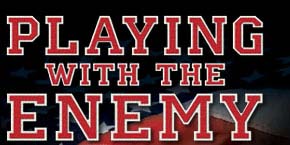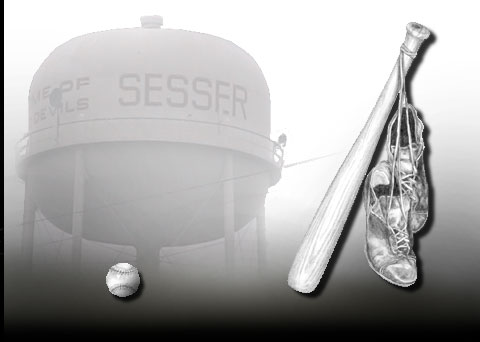|
Sesser, Illinois in 1940
In 1940, baseball was the major source of entertainment for people in America. There was no television in 1940. The sixteen largest cities in the nation enjoyed major league teams, but in smaller communities like Sesser, Illinois, summer life revolved around the town baseball team. Nearly every town—regardless of size—had a team. The focus in America during the latter years of the depression was local baseball. Sesser is 90 miles from St. Louis, but to most people in 1940 Sesser, 90 miles might as well have been 900 miles. Few people owned a car, the Great Depression was still in full swing, and funds were limited. Sesser folk had three choices: they could listen to St. Louis Cardinals’ games on KMOX radio, read about them once a week in the Sesser newspaper, or go out to “The Lumberyard” and watch the local Sesser Egyptians play ball!
It is easy to romanticize the combination of baseball, small town America, and the coming of age of what we now respectfully refer to as The Greatest Generation. It was a simpler time. There were no steroids and most major leaguers began and ended their career with the same team. There were trades, sure, but the stars and heroes of your team rarely left it to put on another uniform. It was much easier to fall in love with your major league team and carry your passion from childhood to the grave. Today, scandal and transient ballplayers make it more difficult to love “your” team. More likely than not, your favorite player this year will be wearing a different uniform next year, and the player you loved to hate on the “other” team will spend a season or two on “your” team sometime in the future.
In 1940, players played for the love of the game and not the money. Many had to sell cars or peddle insurance during the off-season to supplement their income. Can you imagine Barry Bonds or Jorge Posada doing that today? Today’s players own the car dealerships and insurance agencies and make more in a single season than their average fan will earn in a lifetime. If we wax poetic about the good ‘ole days of baseball and small town America, maybe it’s because life today is so complex and fast that we yearn for a simpler time.
I know I do.
Today, the ball diamond my dad nicknamed “The Lumberyard" is plowed under. Instead of producing ballplayers it sprouts corn and soy beans. During a recent visit to Sesser, Mayor Ned Mitchell drove my son Toby, producer and screenwriter David Ranes, and myself out to see the place where, in 1940, the whole town gathered each weekend to cheer on their local heroes. Before WW II, the spirits of a depression-era Midwestern town rose and fell on the shoulders of the Sesser Egyptians. “The Lumberyard” was seated on the outskirts of the town, but spiritually and emotionally it was the center of that tiny community’s universe.
Life moved on, baseball moved on, and the bats at “The Lumberyard fell silent. Nothing marks that field today. As I stood there, watching as the occassional car or pick-up truck drive past, I realized that the odds were that not a single one of the passers-by knew that patch of ground was much more than an ordinary Midwestern farm field. To the good people of 1940 Sesser, it was hallowed ground.
I can hear the crack of the bat, the roar of the crowd, and visualize my dad, Gene Moore, squatting behind the plate and calling the game like a field marshal. He was just fifteen years old. His whole life in baseball was ahead of him—or so he believed. But Life had other plans for Gene Moore.
|


 www.PlayingWithTheEnemy.com
www.PlayingWithTheEnemy.com





